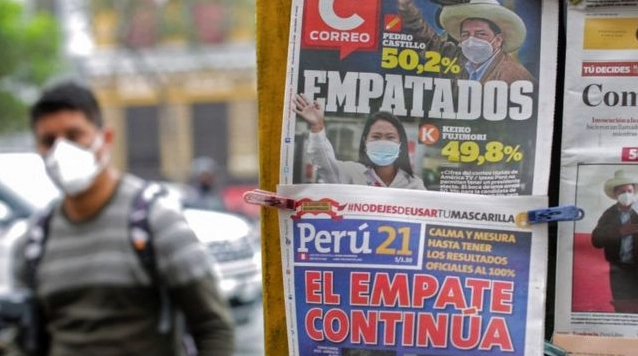Latin America will hold six presidential elections in 2024, a year that will see half the world vote in many cases for president, as a total of 80 elections will be held around the globe. Along with the votes comes the legitimate effort to measure them through polls… and the illegitimate efforts to confuse or mislead those votes by making use of fake polls, false polls that fabricate results intending to shape the electoral mood of citizens.
These manipulations through the dissemination of invented results, impossible to verify or validate, or using non-scientific approaches to measuring preferences serve to generate a climate of opinion artificially and thus fuel controversies, debates, and intensification of certain disadvantaged candidacies, especially in social networks. Unfortunately, they also gain repercussions in the most prestigious media without a team trained to distinguish genuine polls from fraudulent ones. Worse still, they end up generalizing the image that all polls are the same regardless of the neatness and methodological care of some and the indifference to those canons for the fake polls, giving oxygen to those who intend to keep the population uninformed with extensive embargoes for the publication of well-done research.
This is a problem in Latin America, for example, where fifteen of the eighteen countries studied by the WAPOR/ESOMAR committee have a pre-electoral blocking period for the dissemination of poll results, where citizens, therefore, cannot find out about the most recent voting trends even though the companies and governments that contract them do have private access to them, generating a situation of inequity and absence of information. The exceptions are Brazil, Guatemala, and Suriname. In fact, in our region, embargoes on the dissemination of polls are longer than in the democracies of Europe, North America, or Asia.
The absence of restrictions on the publication of polls as in Brazil does not exempt its citizens from living with fake polls or the strong suspicion of artificial production of poll results. The regulation of professional practice in the field of electoral polls is perhaps one of the most advanced in terms of seeking guarantees of transparency in the competitive process since it is a precondition for the disclosure of any poll that it be registered with the Electoral Justice, five days before it be published. Otherwise, heavy fines and the prohibition of its broadcasting are applicable. The registration must include not only the results but also other details such as the sample (to indicate its social representativeness or not), the dates of the survey (to indicate its validity), the collection method used (to indicate whether all voters had the opportunity to be chosen or whether it only covers those who have an online account or a telephone line) and the questionnaire (to indicate possible biases or not in the formulation of questions). It is also mandatory to indicate who requested the survey and the amount paid for it with the invoice.
These requirements mean that only consulting firms and institutions with clear competencies, solid professionals, and a strong tradition in the art of conducting electoral surveys should engage in this practice, which becomes a barometer of the social mood at the moment when its results are disseminated by the media. Naturally, these prerequisites of professional skills and institutional background in the practice of the industry presuppose the existence of clear and relatively large contracts to cover the financial demands of reliable public opinion polls.
However, what the 2022 presidential election in Brazil revealed was that 4 out of 10 published polls (out of a total of almost 2,140 registered polls) were financed with their own funds and with no entity (candidate, party, or other organization) contracting and demanding the study, an indicator of low transparency and potential discretionary political use of their results. Compared to the previous presidential election (2018) there was a phenomenal increase in registered surveys (almost 60% more), overwhelmingly (80%) conducted by companies that are not linked to the professional or ethical code of practice guideline associations in the exercise of the profession such as WAPOR (The World Association for Public Opinion Research) or ABEP (Brazilian Association of Research Companies). The institutional background is not related to public or political research, but rather to communication agencies or marketing companies, in several cases without existence before (or after!) the election year.
Obviously, it is not a crime to self-finance studies. Nonetheless, considering the scale that occurred in Brazil (something that may be revealing parameters of what is happening in our region as a whole) comes to trigger suspicions about the true intention and contents of such surveys. Within the work carried out by the public opinion committee of ABEP, they concluded that, coincidentally, the bulk of the reported results that strongly deviate from the final official figures came precisely from those surveys declared as self-financed.
These measurements under suspicion end up creating the impression that the mismatches due to relative imprecision of the forecasts concerning the final results are congenital flaws of the polls, something that multiplies distrust when it does not support the voices that seek to suppress them. This non-relativization of punctual mismatches between what a candidate got and what the polls of serious and respectable entities indicate as if they were outright failures (even if the polls were right about the order of the candidates, the average difference between the first and the second candidate and even the degree of abstention or null vote) harms the profession and the legitimate information of the citizenship with reliable data.
Public opinion polls are essential to the central process of democracies, the election of authorities, and the indication of the type of mandate voted for: for change or continuity, for rewarding the ruling party by renewing support for it, or punishing it by removing it from power in pursuit of new paths and results. They add transparency to the process by allowing citizens to follow the democratic pulse, the campaigns’ impact on voters, the agenda of citizen priorities that candidates should address, or the direction in which they should govern. Fake polls — as fake news — make a mockery of the popular will by blurring it, and in doing so, reveal the contempt for democracy of their creators.
*Translated by Micaela Machado Rodrigues from the original in Spanish.













